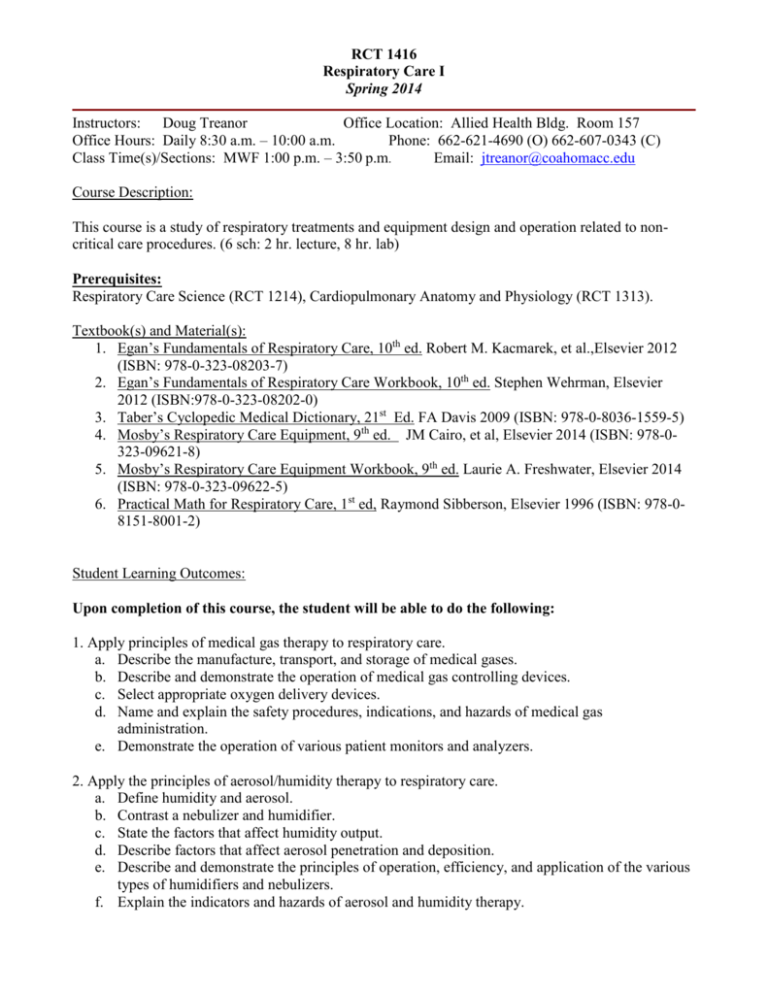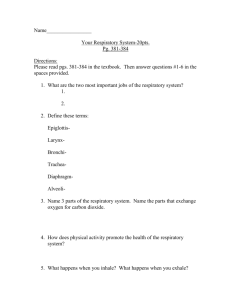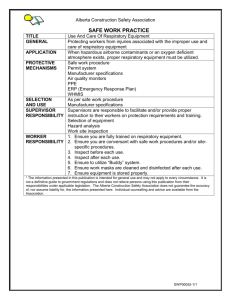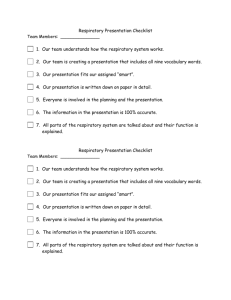RCT 1416 Respiratory Care I
advertisement

RCT 1416 Respiratory Care I Spring 2014 Instructors: Doug Treanor Office Location: Allied Health Bldg. Room 157 Office Hours: Daily 8:30 a.m. – 10:00 a.m. Phone: 662-621-4690 (O) 662-607-0343 (C) Class Time(s)/Sections: MWF 1:00 p.m. – 3:50 p.m. Email: jtreanor@coahomacc.edu Course Description: This course is a study of respiratory treatments and equipment design and operation related to noncritical care procedures. (6 sch: 2 hr. lecture, 8 hr. lab) Prerequisites: Respiratory Care Science (RCT 1214), Cardiopulmonary Anatomy and Physiology (RCT 1313). Textbook(s) and Material(s): 1. Egan’s Fundamentals of Respiratory Care, 10th ed. Robert M. Kacmarek, et al.,Elsevier 2012 (ISBN: 978-0-323-08203-7) 2. Egan’s Fundamentals of Respiratory Care Workbook, 10th ed. Stephen Wehrman, Elsevier 2012 (ISBN:978-0-323-08202-0) 3. Taber’s Cyclopedic Medical Dictionary, 21st Ed. FA Davis 2009 (ISBN: 978-0-8036-1559-5) 4. Mosby’s Respiratory Care Equipment, 9th ed. JM Cairo, et al, Elsevier 2014 (ISBN: 978-0323-09621-8) 5. Mosby’s Respiratory Care Equipment Workbook, 9th ed. Laurie A. Freshwater, Elsevier 2014 (ISBN: 978-0-323-09622-5) 6. Practical Math for Respiratory Care, 1st ed, Raymond Sibberson, Elsevier 1996 (ISBN: 978-08151-8001-2) Student Learning Outcomes: Upon completion of this course, the student will be able to do the following: 1. Apply principles of medical gas therapy to respiratory care. a. Describe the manufacture, transport, and storage of medical gases. b. Describe and demonstrate the operation of medical gas controlling devices. c. Select appropriate oxygen delivery devices. d. Name and explain the safety procedures, indications, and hazards of medical gas administration. e. Demonstrate the operation of various patient monitors and analyzers. 2. Apply the principles of aerosol/humidity therapy to respiratory care. a. Define humidity and aerosol. b. Contrast a nebulizer and humidifier. c. State the factors that affect humidity output. d. Describe factors that affect aerosol penetration and deposition. e. Describe and demonstrate the principles of operation, efficiency, and application of the various types of humidifiers and nebulizers. f. Explain the indicators and hazards of aerosol and humidity therapy. RCT 1416 Respiratory Care I Spring 2014 3. Apply principles of hyperinflation to respiratory care. a. Compare and contrast the major hyperinflation modalities. b. Compare and contrast the goals, indications, and adverse effects of hyperinflation devices. c. Describe the principles of operation of hyperinflation devices. d. Demonstrate the operation of hyperinflation devices. 4. Apply principles of bronchopulmonary hygiene techniques. a. Identify the bronchopulmonary segments. b. Describe the positions required to drain designated lung segments. c. Describe the indications and hazards of bronchopulmonary hygiene techniques. d. Perform bronchopulmonary hygiene techniques to include coughing technique, autogenic drainage, positive expiratory pressure devise (PEP), intrapulmonary percussive ventilation (IPV), Flutter®, and High Frequency Chest Wall Oscillation (HFCWO). 5. Apply principles of airway care and manual resuscitation. a. Summarize the etiology of upper airway obstruction. b. Discuss the indications, hazards, and selection of artificial airways. c. Explain and demonstrate the placement of artificial airways. d. Explain and demonstrate techniques to monitor and insure a safe and effective airway. e. Compare and contrast characteristics of various manual resuscitators. f. Explain and demonstrate the proper use of various manual resuscitators. g. Apply principles of disease management. (1) Monitor treatment outcomes. (2) Initiate and modify therapy based on respiratory care protocol. School Attendance: Regular class attendance and punctuality are expected. All arrangements for completing missed work are to be made with the instructor. It is the student’s responsibility to initiate these arrangements. Excessive absences may result in loss of credit for the course concerned as well as loss of grant refunds and/or financial aid eligibility. The nature of the educational programs at Coahoma Community College is such that it is necessary for every student to attend class regularly. Instructors will keep accurate class records, and those records will become part of the student's official record. NOTE: In the event of inclement weather, the President may cancel classes. Students are advised to listen to the TV or radio for an announcement. Absence without an official closure is treated as an unexcused absence unless there is a danger for the student to drive. Respiratory Care Attendance: The student is expected to attend class 100% of the time. In case of an unavoidable absence, the student is required to submit in writing the requested absence. RCT 1416 Respiratory Care I Spring 2014 An absence will be handled as follows: Telephone notification must be made to the Instructor one hour prior to the scheduled class time. The student must speak directly to the Instructor, Program Director, Clinical Director, or secretary. Leaving messages is not sufficient notification. Failure to follow these instructions will result in immediate disciplinary action according to school and program policy. Students shall not schedule conference times with other faculty or councilors during class time. Any class time missed due to ‘appointments’ with councilors or other faculty will not be treated any differently from other types of tardy or absences. TARDIES: A tardy is considered arriving at any time past the designated class time. Proper notification must be made (see attendance policy). If the student is tardy without proper notification, they may be refused entry into class resulting in the student counted absent. ALL ABSENCES AND TARDIES will result in a grade reduction as follows: Three (3) tardies equals 1 absence. Three (3) occurrences of leaving class before the class period is completed equals one (1) absence. Greater than 3 absences will result in the student being dropped from the class. Absence from Class for School Sanctioned Activities Students who are absent from class due to participation in an officially sanctioned school activity must present notice of the event to the instructor (at least one week prior is desirable) and request advance assignments. If the student is passing the course, the request for make-up will be honored. If missing the class will endanger the student's academic success, the instructor will notify the activity sponsor; the sponsor and the instructor will determine a decision regarding the student’s participation in the activity. In general, the decision will reflect the philosophy that students attend college for educational purposes, and participation in activities outside the classroom is recognized as a lower priority. Canvas Students are responsible for checking announcements and course postings on the Canvas course sites. Make-up Policy: There are no make-up examinations. Depending on the number of tests, up to 2 grades may be dropped at the end of the semester. With the approval of the Program Director and/or Vice President for Health Sciences, with a valid, written explanation of absence, the Final Exam can be made-up within 5 days of the date the exam is given. Students are responsible for any information taught during their absence so they should check with classmates to read or borrow class notes, and make a copy of any handouts. The student should also make an appointment to see the instructor for clarifications, questions, etc. Any missed material will not be re-taught by the instructor. Cheating Policy/Plagiarism/Misconduct: Cheating, Plagiarism, Academic Misconduct, Unprofessional/Unethical as well as Illegal Conduct will not be tolerated. All offenders will be referred to the Vice President for Health Sciences for RCT 1416 Respiratory Care I Spring 2014 disciplinary action. Repeated offenses will result in expulsion from the program. Cheating, Plagiarism and Academic Misconduct, includes, but is not limited to, the following: 1. Copying from another student’s test paper 2. Using the course textbook or other materials such as a notebook normally brought to a class meeting but not authorized for use during a test by the person giving the test. Having such forbidden material open and in sight of the student will be considered prima facie evidence of use 3. Attempting to commit, or to be an accessory to the commission of, an offense listed above 4. Collaborating during a test with any other person by giving or receiving information without authority 5. Using specially prepared materials, e.g., notes, formula lists, notes written on the student’s body or clothing, during a test. Bringing such forbidden material to a test will be considered prima facie evidence of use or attempted use 6. Stealing, buying or otherwise obtaining, all or part of an unadministered test, including answers to an unadministered test 7. Possession/distribution of all or part of an unadministered test 8. Submitting as one’s own, in fulfillment of academic requirements, any theme, report, workbook assignment, term paper, essay, other written work, drawing, or other scholastic work prepared totally or in part by another 9. Selling, giving or otherwise supplying to another student for use in fulfilling academic requirements any theme, report, workbook assignment, term paper, or other work 10. Plagiarizing is the unacknowledged inclusion, in work submitted for credit, of someone else’s words, ideas, work or data Electronic Devices in Class: The use of cellular phones, pagers, CD players, radios, and similar devices is prohibited in the classroom and laboratory facilities. Cellular phones may not be used as a calculator in class. All cell phones will be placed on silent (vibrate mode will be turned off) and placed in the designated container at the front of the classroom prior to the beginning of the class period. Phones may be retrieved at the beginning of a break. However, the above policy will apply again once the break period is completed. If a student is seen with a cell phone during a test, the student’s test will be stopped and a zero given for the test. Audio and video recordings of lecture and lab classes are prohibited. Students whose electrical devices disrupt class may be asked to leave class, marked absent and will not be permitted to return for the session. If the electrical device disrupts an exam or quiz, the student will receive a score of zero (“0”) for the exam or quiz. Non-Discrimination/Disability Policy Coahoma Community College is an equal opportunity institution in accordance with civil rights and does not discriminate on the basis of race, color, national origin, sex, disability, age, or other factors prohibited by law in any of its educational programs, activities and employment opportunities. The following person has been designated to handle inquiries regarding the non-discrimination policies: Wanda G. Holmes, Director of Human Resources/Coordinator for 504/ADA, Title IX Compliance RCT 1416 Respiratory Care I Spring 2014 Officer, Office #A100, Vivian M. Presley Administration Building, 3240 Friars Point Road, Clarksdale, Mississippi 38614, Phone: (662)621-4853, Email: wholmes@coahomacc.edu. Instructional Techniques: Classroom Lecture Demonstration Laboratory Practice Canvas Method(s) of Evaluation: The student's semester average will come from quizzes, assignments, exams and class room participation. The final average will be assigned a letter grade according to the grading scale listed below: Quizzes/Assignments/Exams/Tests 80% Professional Characteristics* 10% Final Examination (comprehensive) 10% *Professional Characteristics includes Attendance, Dress (See Dress Code in Student Program Manual) and classroom preparation/participation. Grading Scale/System: In the Respiratory Care Program the grading system is: A – Excellent 94 - 100 B – Good 87 - 93 C - Average 80 - 86 F - Failure 79 and below NOTE: Students must have a final grade of 80 in each subject (lecture, lab, and clinical) in order to progress in the Respiratory Care Program. Points to pay particular attention to: I do not offer ANY make-up work. Your exams and quizzes (tests) are when they are – not early nor later. If you miss a quiz/exam/test due to: ANY REASON … you miss the quiz and do not have the right to take it at a later date No EXTRA CREDIT is available and after reading this, you will not ask if there is any extra credit available. If you chat in class, I may do any of the following: wait until you are quiet (which will not impact the material we will be scheduled to discuss that class – the student will be responsible for any RCT 1416 Respiratory Care I Spring 2014 part we do not cover); request you leave the class and mark you absent. If you are habitually chatting in class, you may be asked to refrain from attending class. The Respiratory Care Technology faculty expects honest behavior from students in relation to written examinations, papers, or any other assignment. The faculty considers sharing testing instruments, past or present, as a violation of academic honesty. Every student and faculty member has the responsibility to promote the highest standards of honesty. Each student in the classroom is on the honor system and is responsible for his/her own actions, as well as others. Any student aware of another student cheating must inform the instructor within twenty four (24) hours. NOTE: The student is responsible for completing Egan’s Fundamentals of Respiratory Care Workbook and Mosby’s Respiratory Care Equipment Workbook for each chapter utilized from the textbooks. Each student will submit his/her workbooks prior to the final exam starting. Each workbook will be graded for completeness and up to 100 points will be awarded. This outline is intended as a guideline for the course. The university/college/institution and the instructor reserve the right to make modifications in content, schedule, and requirements as necessary to enhance each student’s educational experience and student learning outcomes. TENTATIVE SCHEDULE OF CLASS ASSIGNMENTS/TESTS WEEK ASSIGNMENTS/TESTS 1 Review and assessment 2 Manufacture, Storage & Transport of Medical Gases TBD Administering Medical Gases TBD Humidity and Bland Aerosol Therapy TBD Aerosol Drug Therapy TBD Lung Expansion Therapy TBD TBD Bronchial Hygiene Therapy Airway Management Reading Assignments N/A Mosby Chap. 3 Egan Chap 37 Sibberson Ch 3 Mosby Chap 4 Egan Chap 38 Sibberson Ch 4 5&8 Mosby Chap 6 pgs 158-178 Egan Chap 35 Sibberson Ch 7 Mosby Chap 6 Pgs 178-212 Egan Chap 36 Mosby Chap 7 Egan Chap 39 Egan Chap 40 Mosby Chap 5 RCT 1416 Respiratory Care I Spring 2014 Pgs 113-150 Egan Chap 33 TBD TBA Jan 20 March 10-14 April 18 April 21 May 5-7 Assignments Continued On Next Page Manual Resuscitators to include Basic Life Support Final Exam MLK Holiday Spring Break Good Friday Holiday Observed Easter Holiday Observed Academic Final Exams Mosby Chap 5 Pgs 150-157 Egan Chap 34 Pgs 787-805





